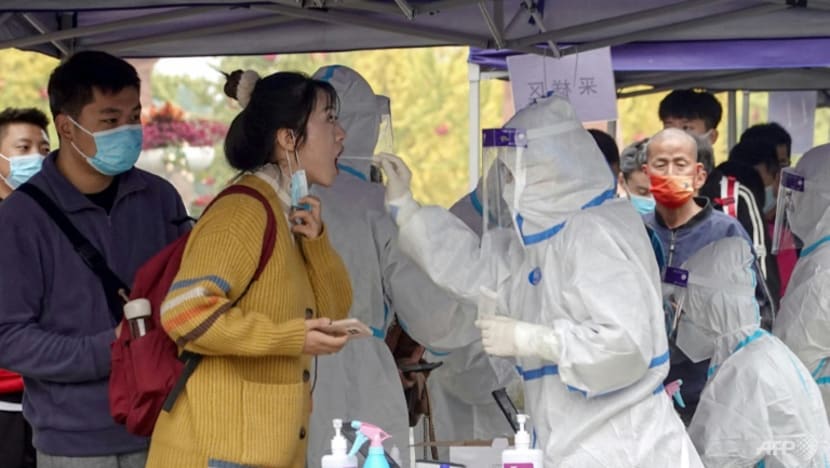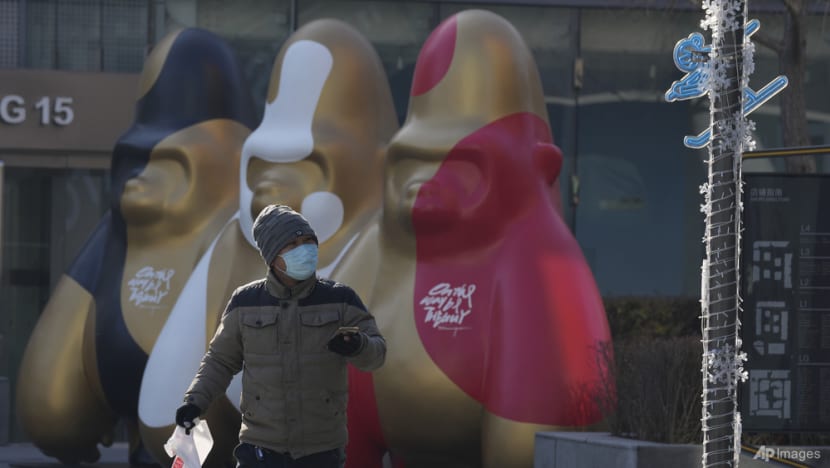Commentary: Why China will uphold its zero-COVID policy for a long time to come
Omicron may have created an initial feeling of vindication. There are also important political milestones in the next six months, says Hong Kong Baptist University’s Yew Wei Lit.

A new COVID-19 outbreak in China has been linked to a group of tourists. (Photo: AFP)
SINGAPORE: Amid the worldwide panic over the spread of Omicron, China is feeling vindicated for sticking to its zero-COVID-19 strategy. All it needs to do at the moment is stay the course.
With expanding vaccination coverage and loosening social and travel restrictions, the world had thought that it was on track for a post-pandemic recovery. But the recent Omicron variant outbreak shows we are far from being out of the woods.
Omicron, designated a "variant of concern" by the World Health Organization, has now circulated globally since it was first discovered in South Africa, appearing to be more contagious than previous variants of COVID-19.
In response to the many unknowns of Omicron, most countries have slammed their borders shut for specific southern African nations, while a few others, such as Israel and Japan, opted to completely ban foreign arrivals.
CHINA IS FEELING VINDICATED
Indeed, Chinese media has seized the latest development to justify the country's zero-tolerance policy, claiming that the nation is an “impregnable fortress” against the virus
To be sure, China was not the only country that pursued this zero-COVID policy.
Australia, New Zealand and Singapore, were once determined to stamp out the existence of the virus within their communities.
Yet, they all fell like dominoes, as they abandoned this strategy in favour of “living with the virus” as recent as two months ago. With masks, vaccines and safe-distancing, caseloads could be bearable for hospitals.
WHY CHINA IS HOLDING ONTO A ZERO-COVID STRATEGY
As the rest of the world normalises co-existing with the virus, why does China remain so steadfast in its commitment towards zero-COVID?
A key reason is China’s enormous population size. To Chinese policymakers, the zero-COVID strategy is - and has been - effective in buying precious time for rolling out vaccinations to all of its citizens.
To put this in context, China’s national drive to vaccinate its population of 1.4 billion people is roughly equivalent to vaccinating the combined populations of Europe and North and South Americas.
Moreover, China has set for itself ambitious targets: 80 per cent vaccination rate by the end of this year (it has exceeded the target by reaching 82.5 per cent), and eventual full vaccination to establish herd immunity to the virus.
More time is also needed for China to manufacture homegrown mRNA vaccines as potential booster shots, since current Chinese vaccines have shown lower efficacy than mRNA jabs.
More recently, China’s top respiratory disease expert, Dr Zhong Nanshan, who is also a key shaper of China’s early COVID-19 strategy, suggested that the virus’s fatality rate must reach the levels of influenza before normalcy is restored.
In other words, a shift in China’s COVID-19 policy remains a distant prospect.
Crucially as well, the quality and capacity of healthcare services across China is highly uneven. The virus could easily overwhelm medical providers in underfunded localities and the countryside.
Are booster shots really necessary? Two infectious diseases specialists break it down on CNA's Heart of the Matter podcast:
According to the calculations of a group of Peking University researchers, published by the Chinese Center for Disease Control and Prevention, the daily number of confirmed cases in China would likely go up to hundreds of thousands, potentially paralysing the country’s medical system, if China follows the “Western” strategy of coexisting with COVID-19.
Beyond these practical reasons, China’s current approach is also borne out of their experience in dealing with the virus’ ground zero.
After enduring widespread criticisms for government ineptitude in their early responses to COVID-19 in Wuhan, Beijing then resorted to aggressive measures, shutting down the city and marshalling the Maoist rhetoric of waging a guerrilla warfare against the “invisible enemy”.
By all measures, the costly strategy was effective, as it brought infection cases to zero in Wuhan by April 2020. The Wuhan model would then become the China model.
Under a toxic combination of Western xenophobia and geopolitical tensions, China was then unfairly blamed for “causing” the global spread of the coronavirus.
What was initially an aggressive but pragmatic Chinese response to the disease then morphed into a nationalistic and ideological endeavour. Media commentaries and wolf warriors uphold the successful act of subduing the disease as a testament to China’s superior governance.
From developing its own vaccine and rejecting the entry of foreign vaccines, to distributing homegrown vaccines to poorer countries as part of its vaccine diplomacy, China is eager to chart its own way in dealing with the pandemic.
But this continuing war-like rhetoric against the virus may also inadvertently put China in a bind. It’s not going to be easy for Chinese officials to switch the narrative from defeating the “enemy virus” to co-existing with it, especially since the latter is viewed as an act of surrender.
Ultimately, Dr Zhong hit on the mark when he pointed out that how long the zero-COVID policy would last “depends on the virus-control situation worldwide” in November. But this also speaks to the potential unsustainability of China’s approach.
WHY A ZERO-COVID STRATEGY IS CHINA’S REALITY FOR A WHILE MORE
Large parts of the world have already been treating COVID-19 as endemic, in part because many scientists believe that the virus may keep mutating, with new strains popping up from time to time.
Based on this reasoning, it is simply a matter of time before Omicron or other future variants find their way into China's borders unless China shuts itself off from the world altogether or imposes some of the stiffest restrictions with quarantines and testing.
Even then, the current Delta variant outbreak that has enveloped at least 21 Chinese provinces, with the largest Delta outbreak ever just last month, is a case in point. Two Omicron cases have since been found in China too this past week.

Omicron also has revealed the existing global vaccine inequity. While only 3.2 per cent of people in poor countries have been fully vaccinated, the figure is more than 65 per cent in both high-income and upper-middle-income countries, according to the non-government organisation ONE.
As long as the virus remains unchecked in certain parts of the world, there will be new dangerous variants that could extend the clock of China’s zero-COVID policy.
President Xi Jinping seems to have recognised this threat when he pledged to deliver 600 million vaccine doses to Africa last month.
Yet, China’s zero-COVID strategy will likely be retained for most of next year. After all, important stages are being built for victorious proclamations by China early next year.
Besides the Winter Olympics in February and the legislative meetings by the National People’s Congress in March, there will be the 20th National Congress of the Chinese Communist Party that many observers expect will endorse a renewal of President Xi’s leadership.
And while there has been an obvious post-pandemic economic slowdown, China’s large domestic market and technological self-sufficiency have so far staved off pressures to reopen its borders.
The Chinese people are on the same page as their government. Survey research has found that despite public grumblings about the inconveniences caused by China’s zero-COVID strategy, popular faith in Beijing’s pandemic policy has in fact strengthened.
And if experiences from other parts of the world haven’t made it clear enough, pandemic policies are as much a political decision as a scientific response.
Unless there is large-scale public disgruntlement, Beijing will likely not reverse their stance anytime soon. So far, there is little to lose and so much to gain politically for China’s persistence in a zero-COVID strategy.
Yew Wei Lit is a lecturer in the Department of Government and International Studies at Hong Kong Baptist University.






















